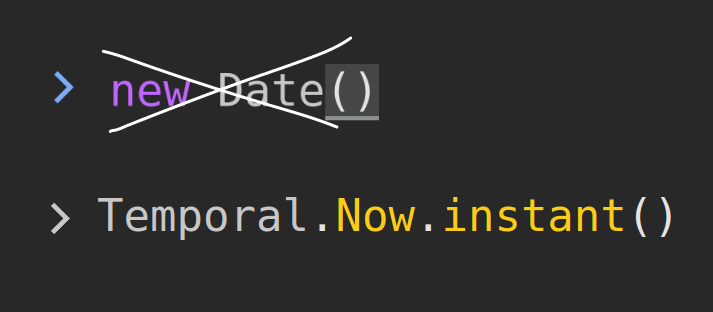How to use the new Temporal API

Working with JavaScript Date has always been a struggle. Libraries like
moment (18kB gzipped),
day.js (3kB gzipped) and
luxon (23kB gzipped) filled the gap by
giving a more developer friendly API, but they take up more network bandwidth,
add dependencies and increase build times. That's where Temporal comes in.
Browsers have been working hard to implement Temporal with the
TC39 Stage 3 draft specification so we
hope to see it fairly soon. In the meantime we can test it out with Deno 1.40.0
under the unstable flag --unstable-temporal or using the
polyfill for npm.
Temporal fixes a lot of the problems that Date had, here's a few examples and
tips to get you started using Temporal.
Notable changes
-
Values follow ISO 8601 standards
// Months start at 1 instead of 0 (new Date("2024-01-01")).getMonth(); // returns 0 (January) Temporal.PlainDate.from("2024-01-01").month // returns 1 (January) // Weekdays start at 1 instead of 0 (new Date("2024-01-01")).getDay(); // returns 0 (Monday) Temporal.PlainDate.from("2024-01-01").dayOfWeek; // returns 1 (Monday) -
Dates can be created independent of timezone (no need for
.split("T")[0])new Date(); // 2024-01-01T07:00:00.000Z (I'm in Mountain Standard Time) Temporal.Now.instant(); // similar to `new Date()` Temporal.Now.plainDateISO(); // 2024-01-01 Temporal.Now.plainDate(calendar); // let's you specify a calendar -
Time can exist without a date
Temporal.PlainTime -
Time span has a dedicated object
Temporal.Duration, with built in calculations and ability to cast the unit by rounding to a unit of choice e.g. years, days, seconds, nanoseconds. -
Supports daylight savings time arithmetic (those bugs are the worst)
-
Powerful options for parsing to machine readable strings with
toString(), and human readable strings.toLocaleString()Temporal.Now.instant().toLocaleString("en-US", { calendar: "gregory", era: "short", year: "numeric", month: "long", day: "numeric", }); -
Immutable values, so mutations will return new instances
// adding time (you can go back in time with negatives or `.subtract()`) const now = Temporal.Now.zonedDateTimeISO(); const newInstant = now.add({ years: 20, months: 4, nanoseconds: 500 }); // or, overwriting the time const old = Temporal.Now.plainDateTimeISO(); const changed = old.with({ minutes: 0, second: 30 });
Related Links
- Blog post: Fixing JavaScript Date (Maggie Pint)
- Blog post: Dates and Times in JavaScript
- tc39 proposal
- proposal documentation
- Chromium progress https://chromestatus.com/feature/5668291307634688
- Mozilla Firefox progress https://bugzilla.mozilla.org/show_bug.cgi?id=1839673
- Safari Webkit progress https://bugs.webkit.org/show_bug.cgi?id=223166
- Browser public support https://caniuse.com/temporal
- MDN documentation authoring https://github.com/tc39/proposal-temporal/issues/1449